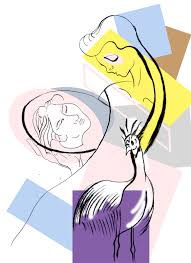What is a midlife crisis? Simply put, it’s when people experience an emotional upheaval or identity confusion at the age of 40. But what causes this, what are its stages and how can we manage it? This article will explore all aspects of this phenomenon in detail.
Contents
- 1 What Is Midlife Crisis?
- 2 Stages of Midlife Crisis
- 3 Symptoms of Midlife Crisis Stages
- 4 Causes of Midlife Crisis Stages
- 5 Types of Midlife Crisis Situations
- 6 Midlife Crisis Stages
- 7 Types of Midlife Crisis
- 8 Coping with Midlife Crisis Stages
- 9 Therapies For Midlife Crisis Stages
- 10 Final Thoughts
- 11 Conclusion
What Is Midlife Crisis?

A midlife crisis is a state of emotional or psychological turmoil that often occurs at the midpoint of one’s life. In some cases, it can also have physical symptoms as well.
The term was first coined by Erik Erikson, a psychoanalyst who studied human development. He believed that the midlife crisis is a time when people face important choices about their lives and must come to terms with their mortality.
A midlife crisis usually begins with depression and anxiety. The initial symptoms may be quite mild or severe depending on the person’s age, coping strategies, resilience to stressors as well as mental health history.
So, there is no one single definition of what constitutes a midlife crisis. However, it generally refers to a time of upheaval or turmoil that occurs in the middle years of life, typically between the ages of 40 and 60.
Stages of Midlife Crisis
There is no one-size-fits-all approach to a midlife crisis. Some people go through all stages while others only experience a few. The four stages of a midlife crisis are:
Stage One: Disengagement
During this stage, people may feel like they are no longer in control of their lives. They may feel uncertain about their future and what lies ahead for them. This can lead to feelings of anxiety and depression. Some common symptoms include feeling overwhelmed, restless, and impatient.
Stage Two: Reevaluation
During this stage, people begin to question their life choices and whether they have been living a meaningful life. They may also start to doubt their abilities and feel like they are no longer as young and vibrant as they used to be. This can lead to feelings of insecurity and low self-esteem.
Stage Three: Reconstruction

This is when people begin to take control of their lives and make changes to create a better future for themselves. This stage can also be the most positive one because it allows them to look forward with hope and optimism instead of dwelling on past regrets and disappointments. Some common signs that someone may be going through this stage of a midlife crisis include:
- Feeling repulsed by the person they have become,
- Falling in love with someone else or wanting to fall in love again,
- Taking on new hobbies
Stage Four: Relinquishment
This is a time when people feel more peaceful about themselves and their lives because of all the changes that were made. They may also feel like they have a better understanding of themselves and the world around them.
Some common signs that someone is going through this stage include:
- feeling grateful for all their life experiences,
- Coming to terms with what happened in past relationships, and
- Finally realizing why certain things were necessary for them at that time
Symptoms of Midlife Crisis Stages
Many different symptoms can indicate someone is going through a midlife crisis. While not everyone experiences all of these symptoms, they are commonly seen in people who are going through this time of upheaval.
The most common symptoms include:
- Depression and anxiety,
- Feeling overwhelmed or stressed,
- Loss of interest in things that used to please them,
- Low self-esteem,
- Restlessness and impatience,
- Lack of motivation
Causes of Midlife Crisis Stages
There are many reasons why someone might experience a midlife crisis. Some common causes include:
- Experiencing jobs loss or financial hardship in the family during this time,
- Loss of a loved one or friend (divorce, death in the family),
- An empty nest when children leave home for college and other reasons,
- The realization that they are reaching an age where their parents will begin to need more help with medical issues
Types of Midlife Crisis Situations
There is no one-size-fits-all approach to a midlife crisis. However, there are four common types of midlife crises that people can find themselves in:
The Crisis of Becoming Aware
This is when someone begins to realize they are getting closer to the end of their life and have not accomplished everything they wanted to. They may feel like they are running out of time and feel a sense of urgency to do something about it.
The Mid-Life Crisis of Loss
This occurs when someone experiences a significant loss such as the death of a loved one, divorce, or job loss. It can be difficult for them to cope with the changes that have been thrust upon them and they may feel anxious and depressed as a result.
The Crisis of Meaninglessness
This is when someone feels like they are not making the most out of their life because they have no goals, passion, or purpose. They may also begin to wonder what it’s all for if nothing seems to matter anymore. This can lead them down a dark path where they do not know what to do with themselves and feel lost.
The Mid-Life Crisis of Identity
This is when someone feels like part of their identity has been stripped away from them. It is because something significant happened in the past that changed who they were. This can make it difficult for them to understand how things will work out if a huge part of their life is no longer there.
Midlife Crisis Stages
In Men

Midlife crisis stages in men usually involve dealing with things like loss, anxiety, and anger. Some common symptoms include:
- Feeling restless or irritable for no particular reason,
- Having trouble sleeping at night,
- Find it difficult to concentrate on important tasks, and
- Experiencing fatigue during the day
These symptoms can lead to men feeling insecure and uncertain about their roles in life.
In Women

The stages of a midlife crisis in women are often more emotional than physical. Common symptoms include:
- Feeling sad or weepy for no particular reason,
- Experiencing changes in appetite,
- Having trouble sleeping at night, and
- Experiencing fatigue during the day
These symptoms can lead to women feeling uncertain about their roles in life.
Types of Midlife Crisis
There are many different types of midlife crises that people experience for a variety of reasons. Here is just a brief list:
Postponement Crisis: This type occurs when people delay facing their midlife crisis until it is too late.
Work-Related Crisis: This type occurs when people feel like they have reached a dead-end in their career and are no longer satisfied with what they do.
Marital/Relationship Crisis: This type occurs when people are going through a divorce, struggling to keep their relationship together, or have lost their spouse.
Empty Nest Syndrome: This type occurs when children have grown up and left the home, leaving parents feeling lonely and isolated.
Parental Role Reversal Crisis: This type occurs when children are now taking care of their aging parents instead of the other way around.
Healthcare Crises: This type can occur when people are worried about their health and the state of their bodies.
Financial Crises: This type occurs when people feel like they do not have enough money to meet all of their financial obligations, such as paying bills or retiring comfortably.
This list is just a brief introduction to midlife crises and the different types that exist.
Coping with Midlife Crisis Stages
There are many strategies people can use to cope with a midlife crisis or help someone they know who may be facing this situation:
- Talking things through and sharing your feelings,
- Unplugging from social media on occasion and spending more time doing hobbies and activities you enjoy,
- Looking for ways to improve your health and fitness levels (diet, exercise),
- Spending time with family or friends who can offer advice or support during this difficult time
Therapies For Midlife Crisis Stages
If the symptoms of a midlife crisis are proving to be too much for someone to handle on their own, then they may want to consider seeking help from a therapist. Many different therapies can be helpful during this time including:
Counseling
Counseling can help people get to the bottom of what is causing their midlife crisis and find ways to cope with it so they can move forward. The counselor will ask them questions about their past, present, and future during these sessions to determine exactly where things started going wrong for them.
Group Therapy
Group therapy is a great way for people to share their experiences with others who are going through the same thing. This can be helpful in terms of feeling understood and not so alone, plus it can offer advice and support from those who have been there before.
Art Therapy
Art therapy is when someone uses creative outlets such as drawing, painting, or sculpting to express their feelings. This can help them cope with a midlife crisis by helping release some of the pent-up emotions that may be affecting their wellbeing and putting things into perspective for them at the same time.
Psychotherapy
This type of therapy helps people understand their thoughts and feelings and how they are impacting their life. It can be helpful for those who feel like they are stuck in a midlife crisis and do not know how to move on.
Medication
If someone is struggling with severe depression or anxiety as a result of their midlife crisis, then medication may be prescribed to help them get through it. It is important to speak with a doctor about the best course of action for you if this is the case.
Meditation
Calming techniques such as meditation can help someone who is going through a midlife crisis to find some peace within themselves. This can be done in short bursts or longer sessions, depending on what works best for the individual.
Final Thoughts
The hardest part about confronting a midlife crisis is knowing that there are no easy answers when it comes to what will make you happy again. It can be a difficult time for anyone to go through, but it is not insurmountable. Therefore, by understanding the symptoms and causes of a midlife crisis, you can put yourself in a better position to manage it in a way that works for you.
Conclusion
A midlife crisis is a difficult time for people to go through. It can leave them feeling anxious, depressed, and even lost in some cases.
However, there are many strategies you can use to help yourself or someone close to you who may be experiencing this situation. Such as talking things through with friends and family members, looking for ways to improve your health and fitness, seeking help from a therapist, and using calming techniques such as meditation.
Remember that there is no one-size-fits-all answer when it comes to managing a midlife crisis, so find what works best for you and stick with it.
If you are looking for affordable Online Counseling MantraCare can help: Book a trial therapy session


